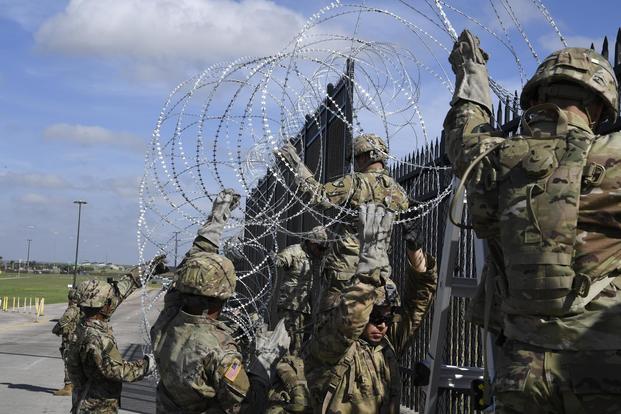Acting Defense Secretary Patrick Shanahan told President Donald Trump on Wednesday that the military is planning border security enhancements, suggesting that the deployment of active- duty troops to backstop Customs and Border Protection (CBP) could be extended past the Jan. 31 deadline.
"We're doing additional planning to strengthen the support that we're providing to Kirstjen and her team," Shanahan said in a reference to Homeland Security Secretary Kirstjen Nielsen.
"We've been very, very closely coupled with Kirstjen," he said in brief remarks at a White House Cabinet meeting presided over by the president. "The collaboration has been seamless."
Shanahan, seated next to Trump during the meeting, said the border troops are conducting daily operational training and focusing on the "restoration of fences," as well as "building out additional mileage for the wall."
In his only public remarks on his first full day as acting secretary, Shanahan said, "The Army Corps of Engineers is dialed in on doing this cost-effectively and with the right amount of urgency as to where we can build additional stand-up walls quickly and then get after the threat.
"The threat is real. The risks are real. We need to control our borders," Shanahan said in remarks that echoed those of Trump on the need for border security enhancements, including major extensions of existing border walls.
Days before the November midterm elections, the military -- on Trump’s orders -- began deploying active-duty troops to southern border states to support CBP against a population of migrants streaming north, many of whom said they were seeking political asylum from violence in Honduras, Guatemala and El Salvador.
A total of 5,900 active-duty troops eventually were deployed to the border, according to U.S. Northern Command. The active-duty personnel were in addition to about 2,100 National Guard troops who had been on the border since April.
The active-duty service members had an initial withdrawal date of Dec. 15. In early December, then-Defense Secretary Jim Mattis said the number of active-duty troops on the border would be reduced, but those remaining would have their deployments extended to at least Jan. 31.
In an informal session with Pentagon reporters last month, Mattis estimated the cost of the active-duty deployment was about $72 million through mid-December.
On Dec. 21, Northern Command said that about 2,600 active-duty troops remained on the border, including 1,200 in California, 700 in Arizona and 700 in Texas. Last week, Pentagon officials speaking on background said it was unclear whether those troops would be extended past the Jan. 31 deadline.
The troops' presence could also be affected by any proposed resolution to end the partial government shutdown, now in its 13th day.
Homeland Security is one of several departments whose appropriations were not passed in the last Congress, resulting in border patrol agents working without pay. The Departments of Defense and Veterans Affairs both have their budgets fully funded and are not affected by the shutdown.
At Wednesday's Cabinet meeting, Trump praised the active-duty troops' contribution to border security, and he was adamant that the government shutdown would continue until House and Senate Democrats agree to more funding for the wall.
"The military's been fantastic. We've been working with Pat Shanahan. So much has been done. The Army Corps of Engineers has been fantastic," Trump said. But he added that border security can't be assured without the wall.
In areas where the wall has been erected, "nobody's coming through," Trump said.
"We want to finish it; we want to complete it. You can't have a partial wall," he said, because "people come through" the areas where the wall is absent.
In the areas where the wall is present, "you can't get through unless you're a world-class pole vaulter on the Olympic team," Trump said.
-- Richard Sisk can be reached at Richard.Sisk@Military.com.













